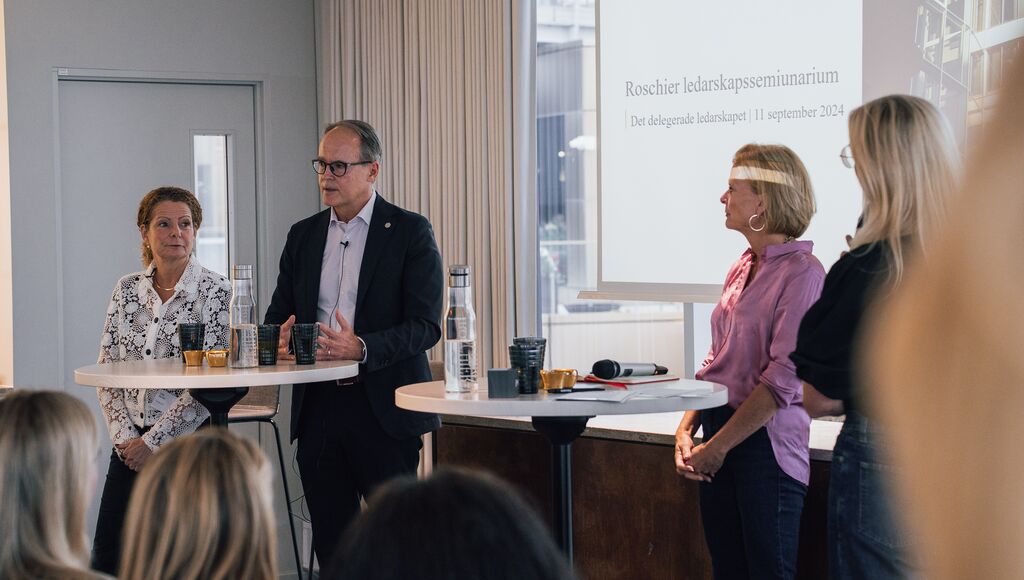
Delegated leadership: Adapting leadership for the hybrid workplace
Insights|September 16, 2024
Last week Roschier’s ongoing leadership seminar series featured a session titled ‘Delegated leadership’, where leading executives explored how leadership must evolve to meet the challenges of today’s hybrid work environment.
Moderated by Petra Wigh from Novare Leadership Academy, the panelists included Cilla Benkö, CEO of Sveriges Radio, Jonas Abrahamsson, CEO of Swedavia, and Åsa Regnér, Secretary General of Save the Children Sweden. Together, they discussed the complexities of leading in a world where teams are often geographically dispersed, and hybrid work has become the norm.
The discussion opened with a key question from Petra: “How do you begin leading in a delegated way?” Although the concept of delegated leadership dates to the 1950s, it has gained renewed relevance after the pandemic. Åsa emphasized the importance of purpose as a starting point: “When people unite around a common vision, it’s easier to pull in the same direction, no matter where you are.”
Jonas added that while leadership labels can feel limiting, the essence of effective leadership remains the same. “Good leadership is about having a clear purpose,” he said. At Swedavia, the purpose of “enabling people to meet” is vital. “That’s something everyone, from baggage handlers to the executive team, can work toward,” Jonas said, noting that clarity of purpose attracts the right talent and motivates employees.
Cilla agreed, sharing how Sveriges Radio developed a collective purpose in collaboration with the entire organization. She highlighted an inclusive process that engaged multiple stakeholders – starting with the management team and board, then company-wide involvement, and concluding with public feedback. “We visited 100 locations across the country to meet listeners and understand their perspectives,” Cilla said, emphasizing the long-term benefits of collaboratively defining the organization’s purpose.
A core challenge of delegated leadership is balancing autonomy with leadership control. Jonas reflected on the temptation to make decisions for the team but stressed the importance of trust. “Making decisions is easy, but is it the best decision? Courageous, engaged employees come from trusting their own judgment,” he said. Cilla shared this sentiment, emphasizing the importance of listening and fostering dialogue, particularly in informal settings where leaders can gain deeper insights from their teams.
An audience member posed a question on managing layers of hierarchy within an organization. Cilla acknowledged that a leader’s words carry significant weight, sometimes more than intended: “It’s easy for a casual comment to be interpreted as approval, even when a direct supervisor has given a different directive for weeks,” she said. Despite the need for clear communication, she stressed that a delegating leader must remain present and engaged throughout the organization.
Åsa offered insights from her political background, drawing parallels between leadership and constitutional governance. “Most issues can be resolved at the right level,” she said, “and only, when necessary, should they be escalated to the leader. This ensures a sense of security within the organization.”
The session concluded with reflections on how leaders must continue evolving. Jonas emphasized that delegated leadership requires continual development: “You never finish developing as a leader,” he said, while Cilla highlighted the importance of fostering accountability within teams: “Set goals, measure outcomes, and ensure that the entire organization remains aligned towards achieving those goals.”
This seminar is part of Roschier’s broader effort to provide leadership insights, continuing a series that explores diverse aspects of leadership in today’s rapidly changing world.
About the Panelists
Cilla Benkö is a trained journalist and has been the CEO of Sveriges Radio since 2012. She previously worked as a reporter for Radiosporten, head of Ekot, deputy program director, and vice president of Sveriges Radio. She has also worked at TV4 and was the head of Aktuellt at Sveriges Television.
Jonas Abrahamsson has been the CEO of Swedavia since 2017 and was previously the CEO of E.ON Sweden. Swedavia operates and develops Sweden’s main airports with the mission to make Sweden more accessible, both nationally and internationally.
Åsa Regnér is the Secretary General of Save the Children Sweden. She has held various leadership positions with a focus on rights issues, both within politics and in civil society, in Sweden and internationally. Previously, she held a role at the UN headquarters as Assistant Secretary General and Deputy Executive Director of UN Women, and before that, she was the UN Women Country Director in Bolivia. She has also served as the Secretary General of RFSU.
The Roschier leadership seminar series started in 2023. Please find the previous articles in the links below. The seminar series will continue in the fall.
Caroline Farberger and Annie Lööf on value-based leadership
Peter Wallenberg Jr. and Lovisa Cavalli Wallenberg on leadership over time and generations
Hans Stråberg on ultimate leadership
Ambassador Judith Gough on the art of diplomacy
Ice hockey legend and Olympic gold medalist Mats Sundin on sustainable leadership
Ambassadors Wegger Strømmen, Nicola Clase, and Jakob Nymann-Lindegren on diplomatic leadership